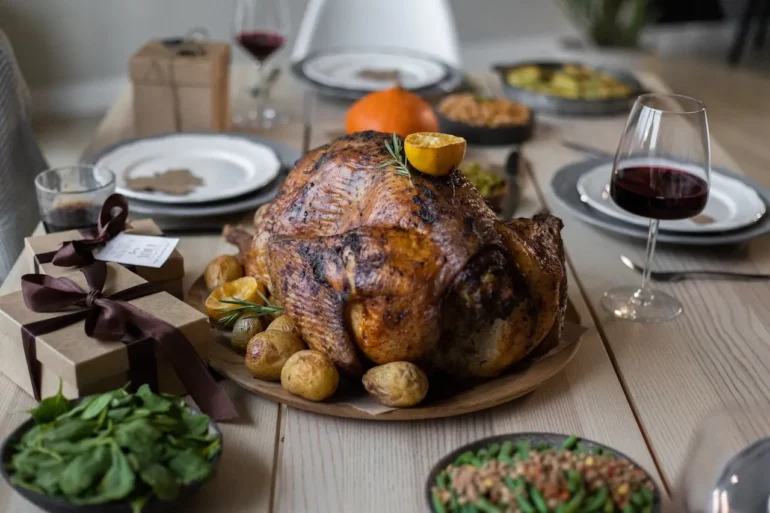Any heavy and full tummy implies that a lot of delicious preparations were just consumed. However, it can also mean uncomfortable things may happen too.
Most Americans feel that it’s just an integral part of the holiday celebrations.
In its latest research, the Calorie Control Council has found that a typical Thanksgiving dinner is packed with more than 3,000 calories. That’s nearly double the recommended calorie intake for adult women based on the 2020-2025 Dietary Guidelines for Americans.
Stomachs can only store so much food before hitting their capacity. You may be surprised to know that on average, an adult’s stomach is similar in size to a clenched fist, capable to hold almost 2.5 ounces if it’s empty and expand to hold nearly 1 quart.
While you fill your stomach up to its capacity, it may cause uneasiness, including indigestion and even nausea.
To prevent that lethargic and bloated feeling, nutrition experts suggest the following 5 tips to minimize intestinal discomfort during the holiday season.
- Avoid Saving Calories for the Party
If you eat consistently throughout the day, then it can help you avoid over-eating during the party. Prolonged waiting in-between meals, until you are starving, may often cause excessive eating, too quickly, which may trigger an increase in bloating.
Rather than saving all your calories for a big meal, consume consistent meals and snacks to support digestion throughout the day. Portion-control foods that may trigger bloat, like a lot of cruciferous vegetables at a single sitting, consuming more fiber than you usually would without building up, or having meals with lots of fats, sodium, and extra sugar.
- Identify Your Triggers
Being a guest at a party, you’ll be at the mercy of what the host serves. It means you might be unaware of the ingredients they are using to prepare their food.
But knowing ahead of time what ingredients may cause discomfort can help eliminate bloat. It could be gluten, dairy, or some other food. That’s why being aware of food intolerances and other triggers is necessary for you to avoid or limit them for preventing digestive issues such as bloating.
It’ll be better to ask the host before the party what they intend to serve. Also, ask about the ingredients in the food. Probably, they don’t wish that you feel unwell.
Identify foods that trigger bloat, maintain a daily food record and look for patterns. You should track the food you consume, the portions, the timing, and emotions at the time, apart from any symptoms you feel. This can help you identify foods that may cause bloat. You could also check other factors such as stress, that may aggravate your symptoms.”
- Include Leafy Greens on Your Plate
Vegetables such as asparagus, kale, spinach, Bok choy, and chard have high water content and are low in calories too. They are packed with minerals, vitamins, and fiber to minimize bloating.
As regular consumption of vegetables is an amazing way to add fiber to the diet, the gradual increase of fiber is the best way to promote healthy bowel movements and lessen bloat.
When you increase your vegetable consumption faster without adjusting to an extra fiber intake, then it may cause more bloat. Moreover, if you fail to increase your water intake while increasing fiber, this may cause bloat and constipation too.
Include an extra half cup of leafy greens every 3 days to gradually increase your intake to boost digestion without the bloat.
Cruciferous vegetables such as broccoli may cause more gas too. That’s why these are often best to enjoy cooked instead of raw to reduce the impact on bloat.
- Make Food Swaps
If you’re the host or know what the host will be serving during the party, you may provide alternative options to choose from. To develop a healthy relationship with food, there are simple healthy holiday food swaps for you to make.
For example, if dairy-filled cheese balls and crackers are a standard appetizer at your holiday dinner table, try to mix it up this year with pita, hummus, and fresh veggies.
Rather than buttery mashed potatoes, switch to a sweet potato alternative.
Instead of opting for a rice dish that’s high in starch, you can prefer legumes, rich in potassium. it’s a mineral that helps flush out the surplus bloat-causing sodium.
Choose milk as an alternative to heavy cream and cut the fat in recipes and minimize large amounts of salt by using flavorful spices such as cinnamon and nutmeg.
If swapping seems challenging, stick to eating in moderation. It’s better to review all food offerings initially before including them on your plate.
Create a balanced plate filling 1/3 with produce, 1/3 with lean protein, and the rest 1/3 with any favorite side dishes to enjoy all the offerings without overdoing it. This can help reduce bloat.”
- Restrict Alcoholic Drinks
Though alcoholic drinks are often part of celebrating the holidays, drinking alcohol after consuming heavy meals can worsen a swollen stomach.
Being an inflammatory substance, alcohol can slow digestion and increase water retention. It’ll make you feel lethargic. Moreover, it can also cause swelling in the body, resulting in gas, discomfort, and bloating.
To prevent dehydration and increase your water consumption, leave visual reminders such as setting your water bottle out where you can see it during the day. Set an alarm on your phone to encourage you to sip on water or use an app the tracking your intake.
To moderate alcohol intake, restrict yourself to drinking a single glass of an alcoholic beverage for women and two glasses for men per day. For each glass of alcohol you consume, drink at least a glass of water.
Try to incorporate fun mocktails made with sparkling water and 100% juice as a delicious way to enjoy the celebration without the added bloat the next day.
Conclusion:- Follow the above tips religiously to feel less bloated after a big holiday meal. Enjoy your food.



